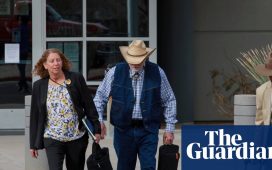With the Afghan new year, or Nowruz, falling during the month of Ramadan this year, Afghans and Afghan Americans around the US who celebrated while fasting prepared with a few traditional dishes to share after sundown last week.
Zuhra, 30, had some of her relatives over to her house in Santa Ana, California. She decorated her dining table green, to celebrate spring, and made haft mewa, an Afghan dish prepared with seven different dried fruits and nuts, which her husband loves.
“Now our life is good,” she said. For years, things had been different.
Zuhra, who asked to be identified only by her first name for fear of reprisal for speaking to the press, arrived in southern California in November 2022, a little more than a year after the US’s chaotic withdrawal from Afghanistan.
Back in her home country, Zuhra said, she held a master’s degree in business administration, had a good career working in human resources for US companies and agencies, and owned her home
“We wanted to stay and serve our people,” she said.
But having worked with foreigners, Zuhra and her husband knew they were at risk as soon as the Taliban took over in August 2021. Zuhra had applied years earlier for a special immigrant visa, or SIV, a coveted and hard-to-get visa established in 2006 for Afghans who had been employed by or on behalf of the US government. Congress is considering adding 12,000 new SIVs for Afghans in its latest funding deal negotiations. Fearful of being arrested, she stopped driving or working late, and covered her face to avoid standing out in public.
Eventually, she chose to move to California, home to the largest Afghan community in the US, to be near relatives who settled here decades ago.
But while finally in safety, the family struggled to rebuild their lives.
Zuhra and her husband had a hard time finding work and an affordable place to rent. Even now, she worries that they will be unable to save any money for their four-year-old son’s future.
Numerous Afghans who have found refuge in the US since the US withdrawal have encountered similar challenges.
The non-profit Tiyya Foundation helps newly arrived immigrants in southern California find work and housing. They also help newly arrived immigrants find work, and directly employ some of them – like Zuhra, who works for the organization as a translator.
Beatrice Kihagi, Tiyya’s family services specialist, explains that having community support makes the challenges of living in one of the most expensive parts of the US more manageable. But it remains tough, she said.
Many of these families did well in their home countries, and their kids at times struggle to adjust to their new reality, Kihagi said: “It’s so hard for them because they could see the kind of life they had back at home was much better than here”– financially, at least. Kihagi says this weighs on parents mentally.
Samir, who asked to be identified by an alias for fear of retaliation against his family in Afghanistan, obtained an SIV and moved his family of six to southern California in August 2023. He worked on agriculture and infrastructure projects for USAid, the United States Agency for International Development, across the southern province of Uruzgan.
He described a harrowing journey leaving his home country, crossing Taliban checkpoints, flying through multiple countries and juggling paperwork, an infant and enormous suitcases. “Not the small luggage,” he explained. “The big luggage, because my wife was willing to take everything.”
His children ran around happily as the family attended a recent Tiyya event called “tea and tots” that gathers families for playdates at a park. He said the biggest opportunity he has in the United States is to educate his daughters, which he couldn’t do in Afghanistan. Now, they speak English, he said proudly, and know how to talk to teachers and do their homework. “When it’s morning early, they are happy to get ready very fast to go to school,” he said. He added his wife is slowly becoming excited to learn to drive.
But the first two months in California were difficult. Samir struggled to get housing because landlords asked for proof of income or a co-signer. He said: “I told them, I’m new. I don’t have income. I don’t know anybody.” He said every step was difficult, and the stress and depression weighed on him, until they found an apartment and could begin remaking their lives.
As the US weighs who should occupy the White House come January 2025, Samir said most college-educated Afghans he knows, and those who worked in the country’s former government, don’t like Joe Biden because of how he handled the withdrawal of US troops in 2021. “They left us and our lives in danger,” he said.
Samir said he’s concerned about illegal immigration and worries that people without the proper paperwork – something he waited for – will have a more difficult journey settling in the US, and that they will compete for resources he depends on. “I hope that we will have the president to support the legal immigrants,” he said.
He thinks Afghans who hold US citizenship, and can vote in November, will look at whoever is doing the most to help refugees.
Zuhra said she’s too new to the US to be able to comment on politics, but she’s noticed the contentiousness of the 2024 election. “There’s division here like there was in Afghanistan,” she said.
She said her relatives who are US citizens are leaning towards voting for Donald Trump.
Roien Rahimi came to the U.S. from Afghanistan almost three years ago and now works for an organization that supports refugees’ mental health. He, too, is still struggling, he said. “I have to work even during the weekend, so I can afford the expenses.”
This makes it difficult to pay attention to the political climate of his new home. “Afghan new immigrants, they’re struggling with their life right now. It’s a bit far to think about the election,” he said. He said he doesn’t follow politics much, but spoke favorably of Donald Trump, and mentioned concerns over Joe Biden’s age. “If they bring good life to people of the US, we are happy. That’s what matters,” Rahimi concluded.






